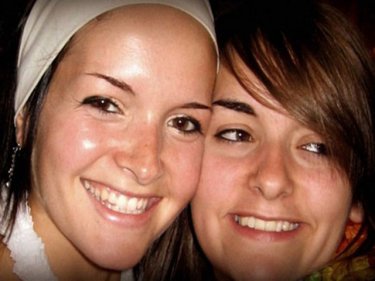PHUKET: Poisons expert Deborah Blum now speculates that a serial killer could be responsible for the mysterious deaths of Canadian sisters Audrey and Noemi Belanger on Phi Phi.
Will this alarming conclusion suddenly make Canadian diplomats and Thai authorities wake up to their responsibility to reveal everything they know about the sisters' deaths?
Not likely, unfortunately. The Canadian envoys are obliged to say nothing, and for their own reasons, the Thai authorities are content to join them under the Cone of Silence.
Like journalists at Phuketwan, Blum has become a keen student of the Belanger case, involving as it does mysterious deaths, an enchanted tropical holiday island, confusing information, and two tragic young victims who had the rest of their lives ahead of them.
When one important group of people involved (the Canadian envoys) are obliged by law to say nothing and another important group (the police) are content to go along with that, conjecture and confusion become inevitable.
The author of 'The Poisoner's Handbook: Murder and the Birth of Forensic Medicine in Jazz Age New York,' Blum is also a Pulitzer prize winning science writer.
As a kind of modern-day Ms Marples, Blum is on the Phi Phi case and keen to see it through. In her latest article for Wired.com on the Belangers, Blum says:
''As I wrote in a second post, ''Poisoning the (Female) Tourist in Asia,'' neither have authorities offered up any clear explanation of what appears to be a whole series of female tourist deaths - many linked to symptoms of poison - in both Thailand and Vietnam during the past several years.
''And as I said Saturday, during an interview on the Weekend edition of NPR's All Things Considered, [on radio] there's a troubling pattern here.
''There's official stone-walling despite evidence of toxic exposure found by both Asian and independent laboratories. This suggests a cover up. '
''And there's a trail of dead women, which suggests that one possibility being covered up is murder, even possibly serial murder.''
Comparisons are being struck with the deaths in Vietnam of American Kari Bowerman, 27, and Canadian Canadian Cathy Huynh, 26, in July and August, of New Zealander Sarah Carter, 23, and others in Chiang Mai earlier, and of American Jill St Onge, 27, and Norwegian Julie Bergheim, 22, on Phi Phi in 2009.
Pressure from envoys and families in the case of Sarah Carter brought a response from Thai authorities who, because of the threat to tourism in Thailand, released detailed updates as they investigated the causes of the deaths at the Downtown Inn.
There have now been four unexplained deaths of young women on Phi Phi.
At least, four that we know of - news of the mysterious fatalities in Chiang Mai grew over time as more deaths were linked to the mystery.
Despite the danger of tourists turning off Phi Phi, the authorities have revealed nothing and used the request of the Canadian envoys for privacy as an excuse.
It seems likely that insecticide was found in the bodies of 20-year-old Audrey Belanger and her 26-year-old sister. That much the local police in Krabi, the province that oversees Phi Phi, have been able to confirm.
But the officers have also said their final report to the Canadian embassy notes that their investigation into the sisters' demise failed to establish a cause of death.
While the future safety of tourists travelling around South east Asia is important, what clearly troubles Phuketwan and Blum is the intransigence of the authorities in this case.
The snuffing out of two young lives in a tropical paradise that has become a rite-of-passage visit for 20-somethings should be deeply troubling to Thai officials and to the Canadian government.
If it is, they ain't saying. How tragic then that more young people appear to now be at risk simply because of a Thailand-sanctioned Canadian coverup.
There is no transparency in this troubling case which, as Blum now says, could well be a double murder.
Some hope remains that advanced technology from the second autopsy that took place in Canada on the Belangers may turn up fresh clues.
But the more time passes, the less that seems likely. And if some clues were uncovered, the Canadians may not feel obliged to tell us anyway.
For what it's worth, we think it's disgraceful that the Thai authorities have not taken control of this case and bucked the Canadian diplomats' request for privacy.
When tourists travel, the laws of their home countries don't usually travel with them. In this case, it just happens to suit the Thai authorities to adhere to the Canadian request for privacy.
Caving in to the Canadians indicates the theories about a coverup are probably correct.
For the sake of the families and friends of these young women as well as for the safety of future travellers, we hope that at some point soon, commonsense and common decency prevail.
Tourist Deaths Raise Poison Expert's Suspicions
POISONS expert Deborah Blum now thinks the deaths of Canada's Belanger sisters on Phi Phi may have been deliberate.
http://www.wbur.org/npr/163303716/tourist-deaths-raise-poison-experts-suspicions/
Poison, Tourism, and Still Unanswered Questions in SE Asia
DEBORAH Blum seeks ''clear and consistent answers. Honesty would be good too.''
http://www.wired.com/wiredscience/elemental//




















what exactly is a "cone of silence" ?
Posted by Your Buddy on October 22, 2012 23:07
Editor Comment:
Complete your education here:
http://www.youtube.com/watch?v=g1eUIK9CihA